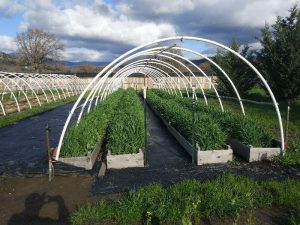Zero Hunger


SDG 2-Fair Planet – Seeding the Way Forward
In the UN goal of ‘Zero Hunger,’ the aim truly is zero. In Ethiopia, Despite a 26.1% decrease in the Global Hunger Index score, 2000 to 2018, 21.4% of the populace are still undernourished, that’s 38.4% of child stunting and 5.8% child morality. The fall in poverty and increase in GDP largely is due to the growing agriculture sector, yet, founder of the Israeli NGO “Fair Planet”, Shoshan Haran is making tremendous contributions to push Ethiopia a step further with a focus on the smallholder farming market.
A proud Kibbutznik, Haran founded Fair Planet in 2011 with the aim to combat issues of low quality seeds, yields and malnutrition & poverty in Ethiopia. Through her work in the seed industry, she realised that companies were unable to help smallholder farmers in developing countries. To put this in context, 83% of the 84million people living in Ethiopia are employed in the agriculture industry. In that industry, the direct contribution of quality seed, alone, is estimated at 15%-45%, yet independent studies have estimated a large annual demand for seed which is never met. On founding the organisation, Haran approached major seed companies and asked them to supply their best quality seeds to Fair Planet. Aiding local farmers, they test the seeds with the lands capabilities, current practices and train farmers in new ways to cultivate the land. The ultimate goal being the reduction in hunger and malnutrition.
One farmer in the Dire Dawa region explains, “I was making a loss instead of profit, we couldn’t get more than 10000etb ($345), since Fair Planet came, we can earn 80,000-90,000etb ($2760-3105).” This year in Dira Dawa, Fair Planet were successful in creating 52 model farms with 13 volunteers. To maximize the quality seeds, thorough training is provided and weekly extension visits are made to the farm during production season providing recommendations and guidance to crop management.
Fair Plant ensures the training of local experts which, in turn, train smallholder farmers and distribute production manuals for each crop and region, in all languages. With 895 extension visits, 36 varieties were tested, 23 training seminars provided and 12 local experts were trained this year in Dira Dawa! These contributions are directly aiding the 2030 goal of doubling agricultural productivity and incomes of small-scale food producers, ensuring food production systems, resilient and sustainable agricultural practices and the 2020 goal of cultivating seed diversity, plants and related wild species.
The NGO ‘Access to Seeds´ whilst explaining Fair Planets’ influence in Ethiopia, introduces Nuri, a local farmer living in the Butajira region, another target region for Fair Planet. A farmer of eight children, Fair Planet were able to supply him with access to good quality seeds. The results after one training season were 5 tonnes of tomatoes with a profit of 17,000etb, after the second training season he received profits of 54,000etb and now grows 2000 m2 tomatoes and 400 grafted avocado trees.
Fair Planet’s work isn’t just helping agriculture; it’s breaking the 7 million people poverty cycle. Take 11 year-old Yasin, when his father goes to work in their farm, Yasin and his sisters find work in other farms for $1 a-day, a bit below the smallholder farmer daily income of $1.5 a-day. With quality seeds and training, Fair Planet have been able to increase yield and income to their family, within two cycles they were able to break the poverty cycle allowing Yasin and his sisters to fulfil their dream of going to school.
With both Public partners such as Israel’s kkl-jnf and local Ethiopian University Haramaya, along with private partners such as Israel’s drip-irrigation innovators Netafim, Fair Planet are changing the face of thee of Ethiopia’s regions; DireDawa, Butajira and Haramaya. Over five years, they have more than 850 model farms, 15,000 smallholder farmers’ beneficiaries, over 150 volunteers and they are not slowing down.
Related articles


SDG 2-ROOTS: Data to Grow 40%-60% More Vegetables
Zero Hunger ROOTS – Sustainable Agricultural Technologies Ltd. has been offering revolutionary products since its inception in 2012 and has helped countless farmers in the


SDG 2 – COP28 & Food Security
Zero Hunger Don’t expect Israel to get all worked up about the arrival of the COP28 climate change summit in the UAE. The country has weightier


SDG 2- Redistributing Leftover Food For Those In Need – SpareEat App
Zero Hunger In recognising food waste presents a fundamental problem to the food systems which we rely on, SpareEat is an Israeli-based company on a



















